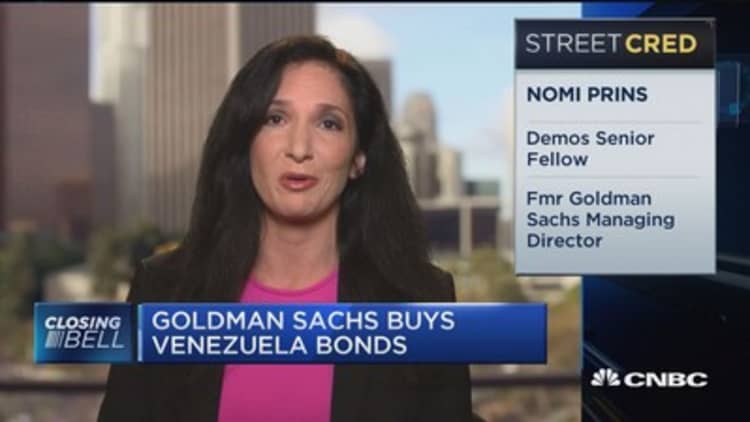
Goldman Sach's purchase of Venezuelan bonds is a problem both optically and ethically, a former managing director of the financial firm told CNBC on Tuesday.
That's because the multinational institution has the ability to move politics, and there is a great deal of social, civil and political unrest in Venezuela, said Nomi Prins.
Goldman Sachs paid $865 million for $2.8 billion in bonds issued by PDVSA, the country's state-owned oil company, working out to 31 cents on the dollar. The deal was first reported by The Wall Street Journal.
"It is a cynically opportunist bet. Can they do it? Yes. Should they be doing it at this particular time? No," she said in an interview with "Closing Bell."
"They are effectively pushing geopolitics at the expense of people. They are not simply providing cash into the … central bank reserves, which right now is at an all-time low," she added.
Goldman Sachs bought the bonds "on the secondary market from a broker and did not interact with the Venezuelan government," the bank said in a statement, adding: "We recognize that … Venezuela is in crisis. We agree that life there has to get better, and we made the investment in part because we believe it will."
The move led the leader of Venezuela's National Assembly, Julio Borges, to threaten that a later government may refuse to honor the bonds. Borges accuses the firm of "making a quick buck off the suffering of Venezuelan people" by hoping to prop up the regime of embattled President Nicolas Maduro.
However, Prins believes Goldman is simply betting that things will change.
"If they change because of political regime change … there can be a bump to the value of … those bonds if there is a more fundamental opposition coming in, which is what I believe Goldman Sachs is betting on," she said.
Steve Hanke, a professor at Johns Hopkins University, doesn't buy "this massive geopolitical story."
"They're on the secondary market. Somebody's going to own them. Whether Goldman owns them or somebody else it really doesn't make any difference," said Hanke, also a senior fellow at the Cato Institute.
However, he doesn't think Goldman managed its reputation risk in a prudent way.
"They didn't think it through. It was a stupid trade from that point of view," he told "Closing Bell."
Goldman Sachs did not immediately respond to a request for comment.
— CNBC's Tom DiChristopher, Wilfred Frost and Leslie Shaffer contributed to this report.


